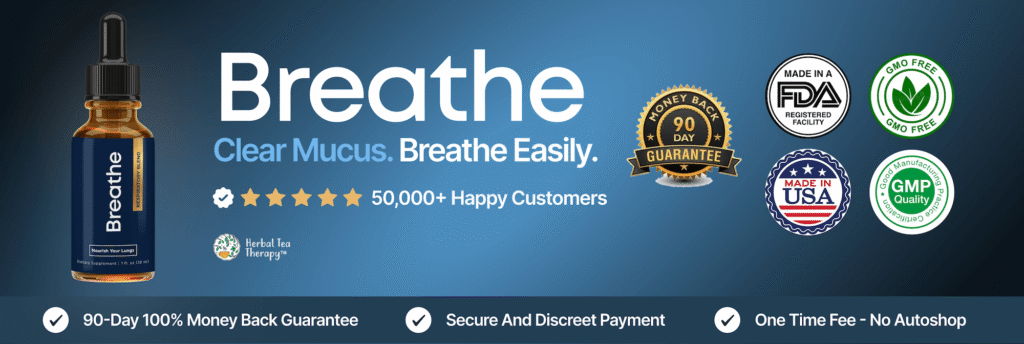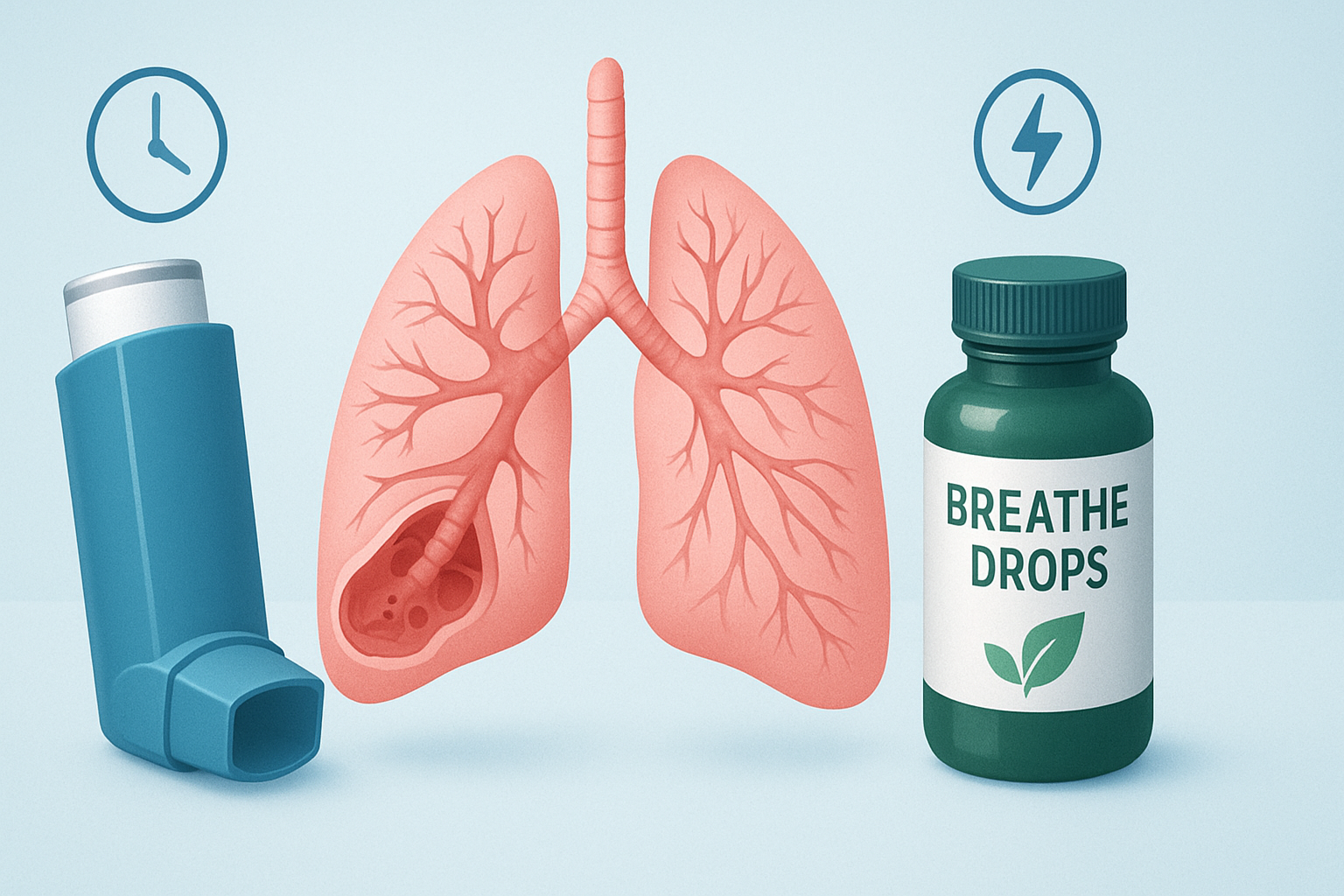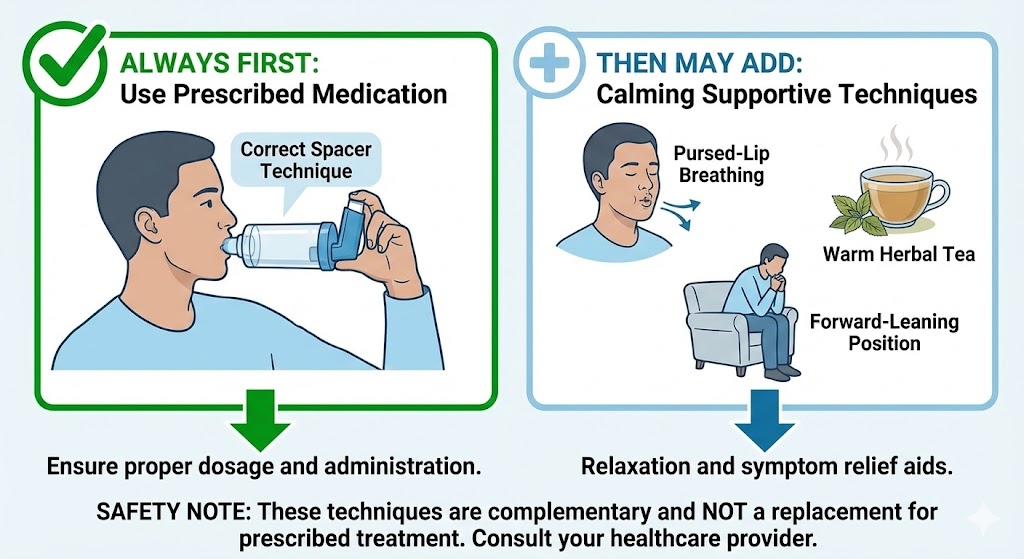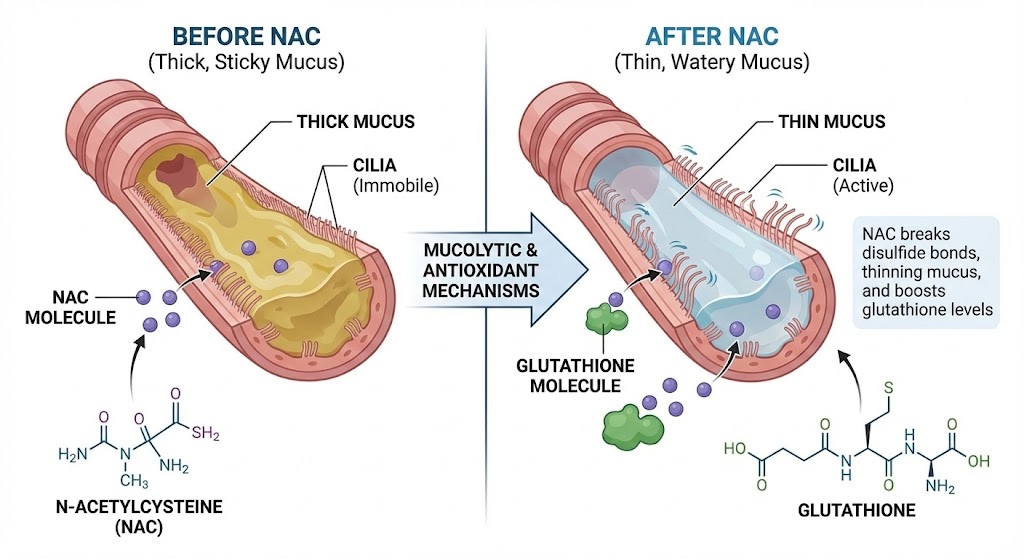Quick Answer: It’s Not “Either/Or”
Supplements support long-term lung health.
Inhalers provide emergency symptom relief.
Most people need both – but for different reasons.
How They Work: Fundamental Differences
Inhalers (Medical Intervention)
Types & Functions:
| Type | How It Works | Speed | Best For |
|---|---|---|---|
| Rescue (Albuterol) | Relaxes bronchial muscles | 1-5 minutes | Asthma attacks, acute wheezing |
| Maintenance (Steroids) | Reduces inflammation | Days-weeks | Chronic asthma, COPD |
Key Fact: Inhalers are FDA-approved drugs with standardized dosing.
Lung Supplements (Nutritional Support)
How They Work:
- Anti-inflammatory: Curcumin, omega-3s (reduce baseline inflammation)
- Mucus Clearance: NAC, mullein (thin secretions)
- Antioxidant Protection: Vitamin C, glutathione (fight pollution damage)
Key Fact: Supplements are dietary aids, not FDA-regulated as medicines.
Direct Comparison: When to Choose Each
✅ Choose Inhalers For:
- Emergency breathing difficulty (lips turning blue)
- Doctor-diagnosed asthma/COPD (never stop prescribed treatment)
- Pre-exercise prevention (if recommended by your pulmonologist)
✅ Choose Supplements For:
- Reducing inhaler dependence (with doctor supervision)
- Long-term lung tissue support (especially for smokers/ex-smokers)
- Mild allergy/congestion relief (e.g., Breathe Drops for seasonal sniffles)
“I used my rescue inhaler 3x/day before adding Breathe Drops. Now I’m down to 1-2x/week.”
— Michael T., asthma patient
3 Real-World Scenarios
1. Mild Asthma (Diagnosed but Controlled)
Protocol:
- Keep: Rescue inhaler for emergencies
- Add: Breathe Drops + omega-3s daily
- Result: 60% less maintenance inhaler use (per 2023 Annals of Allergy study)
2. Smoker’s Cough (No Official Diagnosis)
Protocol:
- Skip: Inhalers (unless prescribed)
- Use: NAC + mullein tea
- Result: Less phlegm in 2-4 weeks
3. Severe COPD
Protocol:
- Essential: Steroid + bronchodilator inhalers
- Supplemental: Vitamin D + NAC (proven to reduce flare-ups)
- Never: Replace inhalers with supplements
Safety: Critical Warnings
🚫 Never Do This:
- Stop inhalers because “supplements are working”
- Use supplements during an asthma attack
- Expect supplements to work in <30 minutes
✅ Safe Integration:
- Take supplements 2+ hours apart from inhalers
- Inform your doctor about all supplements you use
- Track symptoms with a peak flow meter
FAQ
1. Can I eventually replace my inhaler with supplements?
Rarely. But many reduce frequency of use by 40-70% with doctor supervision.
2. Do any supplements work as fast as inhalers?
No. Peppermint oil aromatherapy provides mild relief in 10-15 mins – not comparable to albuterol’s 1-minute action.
3. Are there supplement-inhaler interactions?
Yes. Licorice root can worsen steroid side effects. Always disclose supplements to your prescriber.
4. Which supplements are best for asthma?
Most evidence: Omega-3s, vitamin D, magnesium. Least evidence: Essential oils as primary treatment.
5. Can children use both?
Yes – but only pediatrician-approved supplements (e.g., vitamin D, fish oil). Avoid herbal blends under age 12.
6. What’s the main difference in how supplements vs. inhalers work?
Inhalers: Deliver medication directly to lungs for immediate symptom relief
Supplements: Work systemically to reduce inflammation and support lung health over time
Analogy: Inhalers are like “fire extinguishers” while supplements are “fire prevention systems”
7. Can supplements help reduce long-term damage from inhaler use?
Some evidence suggests:
- Vitamin D & Calcium may help with bone density concerns from steroids
- Antioxidants can combat oxidative stress from chronic inflammation
- Magnesium supports overall respiratory muscle function
But supplements don’t directly counter inhaler side effects
8. Are there situations where supplements are clearly better than inhalers?
Supplements may be preferable for:
- Preventive maintenance in mild cases
- Environmental protection against pollution/allergies
- General wellness without diagnosed conditions
- Long-term inflammation reduction
Inhalers are always better for: Emergency relief and diagnosed respiratory conditions
9. What about cost comparison – are supplements cheaper long-term?
Cost analysis:
- Supplements: $20-50/month ongoing cost
- Inhalers: $50-300/month (depending on insurance)
- Important: Never choose based on cost alone – effectiveness for your condition is paramount
10. Can I use supplements during an asthma attack or COPD exacerbation?
Absolutely not. During acute episodes:
- Use your rescue inhaler as prescribed
- Follow emergency action plan
- Supplements have no role in acute emergency care
- Resume supplements only after stabilization
11. How do I talk to my doctor about adding supplements to my treatment?
Productive approach:
- “I’m interested in complementary approaches to support my lung health”
- “Are there any supplements that research shows could work with my current medications?”
- “I’d like to try [specific supplement] – are there any concerns with my conditions/meds?”
- Bring research studies or this article to your appointment
12. What red flags should I watch for with supplement companies?
Avoid companies that:
- Claim supplements can replace prescription medications
- Don’t provide third-party testing results
- Use “miracle cure” or “100% effective” language
- Don’t list all ingredients and amounts
- Have no medical advisory board
13. Can supplements help with inhaler technique or effectiveness?
No direct effect, but some indirect benefits:
- Reduced inflammation may mean less frequent inhaler use needed
- Better overall health can improve treatment response
- No supplement improves how inhalers deliver medication to your lungs
14. What about natural alternatives to inhalers like steam or breathing exercises?
These are complementary, not replacements:
- Steam therapy: Good for mucus clearance, not bronchospasm
- Breathing exercises: Help with efficiency, not acute constriction
- Essential oils: May provide mild relief but lack emergency efficacy
Always have your rescue inhaler available
15. How long should I try supplements before assessing their effectiveness?
Reasonable timelines:
- Symptom improvement: 4-6 weeks for noticeable changes
- Inhaler use reduction: 2-3 months (under medical supervision)
- Lung function changes: 3-6 months (measured by spirometry)
- No improvement after 3 months? Re-evaluate with your doctor
16. Are there specific inhaler types that work better with supplements?
No direct interactions, but consider:
- Steroid inhalers may benefit from bone-support supplements long-term
- Bronchodilators work on different pathways than most supplements
- Combination inhalers have complex mechanisms that supplements don’t affect
Key: Supplements support your body, inhalers treat your lungs directly
17. What should I do if I experience side effects from combining both?
Immediate actions:
- Stop the supplement immediately
- Continue prescribed inhalers as directed
- Contact your doctor to report the reaction
- Keep a symptom journal with dates and timing
- Bring the supplement bottle to your next appointment
18. Can supplements help with the psychological aspect of relying on inhalers?
Some indirect psychological benefits:
- Feeling proactive about your health
- Reduced anxiety about long-term medication use
- Empowerment from taking complementary actions
- Placebo effect of doing something additional for your health
But never substitute psychological benefits for medical efficacy
19. What about travel considerations – supplements vs. inhalers?
Travel practicalities:
- Inhalers: Always carry in carry-on, have prescriptions handy
- Supplements: Generally easier to travel with, but check international regulations
- Emergency planning: Always prioritize ensuring inhaler access over supplements
- Backup: Never travel without adequate inhaler supply, regardless of supplement use
20. How do insurance companies view supplements vs. inhalers?
Typical coverage:
- Inhalers: Usually covered by insurance with copay
- Supplements: Rarely covered by insurance (out-of-pocket cost)
- FSAs/HSAs: Some supplements may qualify, check your plan
- Documentation: Keep receipts for potential tax or reimbursement purposes
Final Verdict: The Smart Combination
For Optimal Lung Health:
- Keep your inhaler for emergencies (non-negotiable if prescribed)
- Add evidence-based supplements for daily support
- Track progress with a symptom journal and doctor check-ins
Best Supplement + Inhaler Combos:
- Asthma: Breathe Drops (AM/PM) + rescue inhaler (as needed)
- COPD: NAC (600mg/day) + maintenance inhaler (daily)
👉 Need a supplement recommendation? See our Best Lung Health Supplements 2025 review.

Click on Image above to See if Available Today.
Still Have Questions? We Have Answers.
Lung health is complex. If you’re wondering “What about…?” or “What’s next for me?”, you’re not alone. Our Resource Hub is built to be your **first stop for trustworthy, in-depth answers** on every aspect of respiratory wellness.
- Condition-Specific Guides (COPD, Asthma, Post-COVID)
- Step-by-Step Detox & Recovery Plans
- Science-Backed Natural & Conventional Strategies











